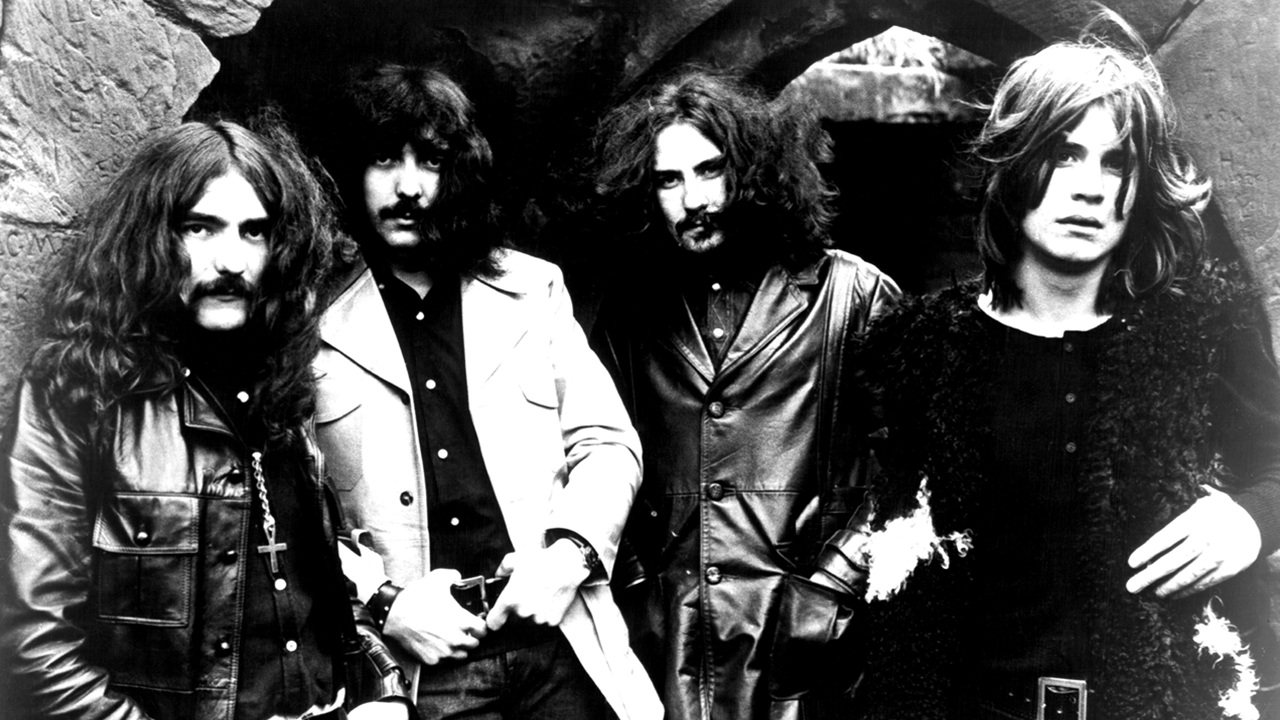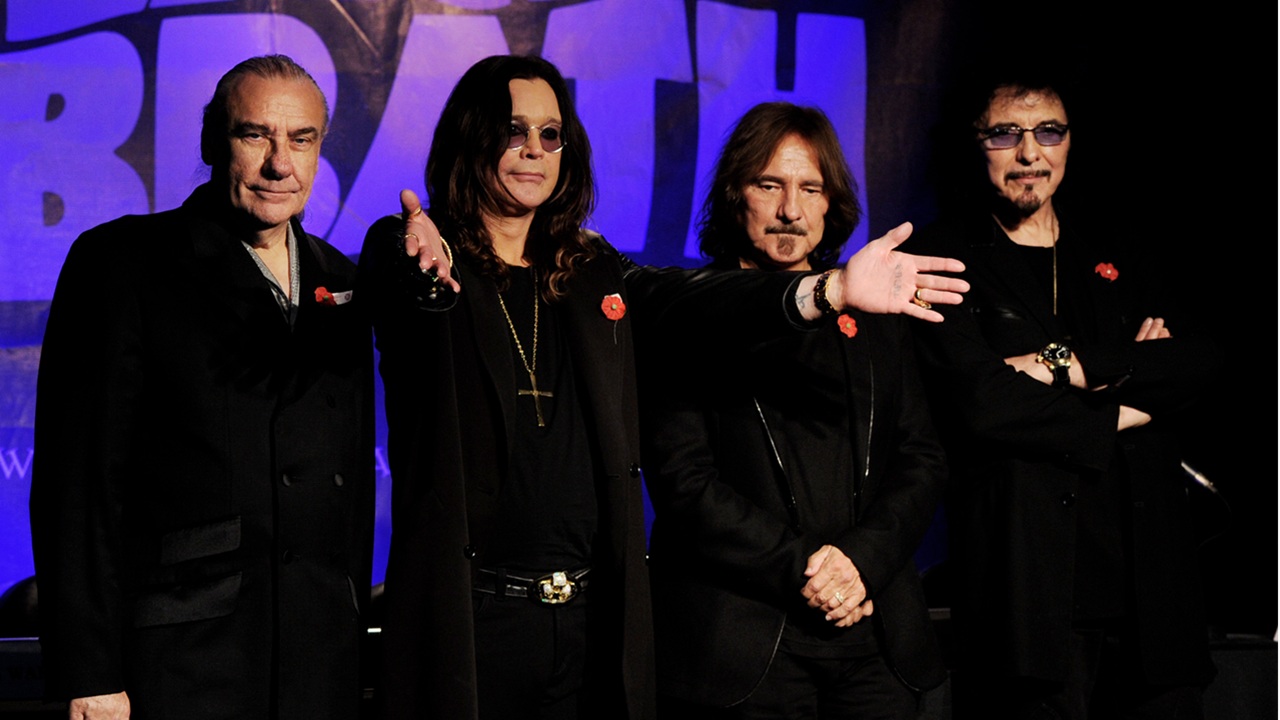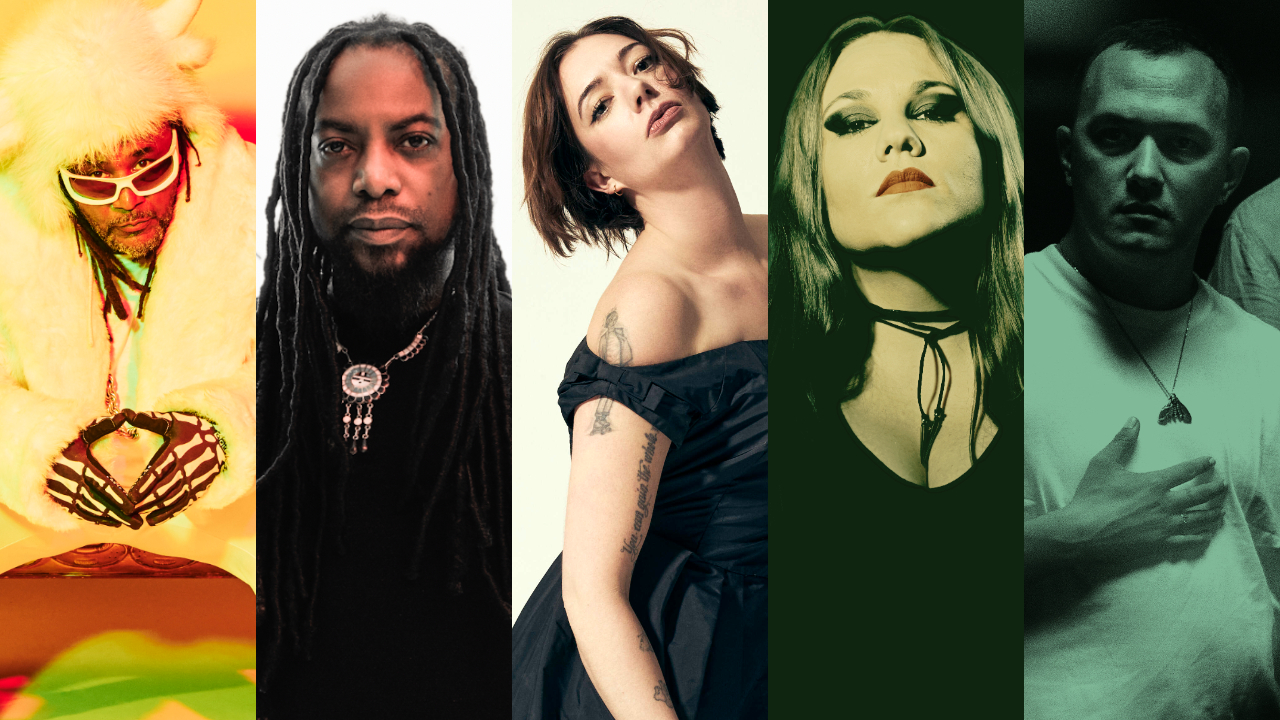"It was the four of us against the world." Behind the curtains of Black Sabbath and Ozzy Osbourne's historic farewell gig
In July, Black Sabbath and Ozzy Osbourne performed their final show together. Weeks later, Ozzy passed away. Metal Hammer caught up with the band ahead of their final farwell

In July, Ozzy Osbourne reunited with his Black Sabbath bandmates Tony Iommi, Geezer Butler and Bill Ward one last time for an all-star farewell performance at Villa Park in Birmingham. Just a couple of weeks later, he passed away at his home. Ahead of the enormous Back To The Beginning celebration, Metal Hammer spoke to the members of Black Sabbath to find out what the gig meant to them.
"It’s not only near where we first played together, but my house is less than half a mile from Villa Park. I can’t believe that in 2025, my last gig ever would be taking place there.”
Ozzy Osbourne is thinking about the past, the present and the future, and they all come down to a single postcode area just north of Birmingham city centre. It was there, in a cramped terraced house on Lodge Road, B6, that the young John Michael Osbourne spent his childhood and formative years.
It was there in B6, too, at the now-vanished Newtown Community Centre, that his band Black Sabbath wrote the song that bore their name, summoning a brand new sound from the dark depths of their young and fevered minds, birthing an entire genre in the process.
And it’s in B6 that Ozzy will make what he promises will be his last ever live appearance, on July 5, 2025 at Villa Park, home of Aston Villa FC. This one-day show is set to be the greatest metal gig of the century, probably even ever. The stacked bill sees pretty much every major metal band from the last 50 years lining up to pay tribute: Metallica, Guns N’ Roses, Tool, Slayer, Gojira, Mastodon, Lamb Of God, Anthrax, members of Ghost, Sleep Token, Halestorm… the list goes on.
And then there’s Black Sabbath themselves. This may be Ozzy’s farewell show, but it’s Sabbath’s too. Fifty-seven years after they first played together, and almost 20 years since they last shared a stage, the four original members – Ozzy plus guitarist Tony Iommi, bassist Geezer Butler and drummer Bill Ward – will close the show with their own set within a stone’s throw of where they grew up and formed the legendary band.
“I’m absolutely amazed at the amount of bands that have come forwards to support us,” says Tony Iommi, sounding genuinely humbled. “It’s a great honour.”
Sign up below to get the latest from Metal Hammer, plus exclusive special offers, direct to your inbox!
If Tony Iommi had written the opening riff of the song Black Sabbath and then gone back to working a regular job, his immortality would still be assured. Bands had heavied up rock before them, but this was something different. An amalgam of sonic power, supernatural horror and the sound of late-60s working-class Birmingham, the song was heavy metal’s Big Bang moment.
“It really did feel like we’d come up with something special,” the 77-year-old guitarist tells Hammer. “It really was a shock to people when we started playing it live. They either loved it or didn’t know what to make of it.”
Sabbath’s self-titled debut album, released on Friday February 13, 1970, went Top 10 in the UK. The follow-up, Paranoid, reached No.1 later the same year. Sabbath were The People’s Band. Sniffy critics hated them, which Tony admits hurt.
“Nobody likes being slagged off for what you do,” says Tony. “But we believed in what we were doing. We loved it.”
What followed was a wild, decade-long rollercoaster ride that these four kids from Aston could never have envisaged.
“We were like brothers,” says Tony. “It was the four of us against the world.”
But a combination of a relentless work rate (eight albums in as many years, the first six stone-cold classics), bad management and increasingly wayward lifestyles ground them down, and Ozzy was fired in 1979. The singer went on to a stellar solo career, while Tony continued to lead Sabbath with a changing cast of musicians.
The bond between the four of them may have been strained at times, but it never broke. There were several reunions over the years, and even an album, 2013’s undervalued 13 (although Bill Ward was absent from the latter due to a contractual dispute).
Still, Tony admits that he wasn’t sure about the idea for the Back To The Beginning show when it was first floated. In his head, Black Sabbath’s The End tour, which wrapped up with a hometown farewell show back in February 2017, was the final full-stop for this iconic band.
“I wasn’t really thinking we’d do another show,” he says. “I didn’t want to do the thing where you say, ‘Here we are, we’re packing up now… and, oh, we’re back again!’ I didn’t want to do that.”
Two things changed his mind. Firstly, the charity aspect - all profits from the gig are going to Cure Parkinson’s, Birmingham Children’s Hospital and Acorns Children’s Hospice. Secondly, the prospect of the original line-up reuniting for the first time in almost 20 years, any differences put aside once and for all.
“There’d be no point doing it without Bill,” he says. “But because this is the original line-up, it makes it more proper. I’m sure it’s going to be emotional.”
Geezer Butler can remember the first time the band played Black Sabbath in public. It was at a pub called The Pokey Hole in Lichfield on August 1, 1969.
“We played it at the end of our usual blues set, and nobody expected what was to come,” he says. “The crowd went crazy.”
Geezer had never played bass before Black Sabbath. He’d been a rhythm guitarist in a series of local Birmingham bands, including one, The Rare Breed, with Ozzy.
“I hadn’t enough money for a bass guitar, so I tuned down all the strings on my Telecaster [guitar] for our first rehearsal,” he says.
He was a quick learner. Geezer’s rolling, rumbling bass was as integral to Sabbath’s success as anything, and so were his lyrics. It’s hard not to see how the depression that has plagued the bassist shaped a song such as Paranoid: ‘Happiness I cannot feel / And love to me is so unreal.’ But for the bassist and his bandmates, being in Black Sabbath was a chance to step away from the rigours of real life.
“The best thing about it was not having to go to work, which I absolutely hated,” says Geezer. “I was born to be in a band, and making a living from what I loved doing was all I could ask for from life.”
Not everybody bought into what they were doing. They were turned down by every record company who heard them, before eventually signing to Vertigo.
“The success of the first album, after all the negative reaction from the music press, record companies – we were turned down by six record companies – and even some family members, was the greatest feeling of all,” recalls Geezer.
He stuck with Sabbath after Ozzy left in 1979, but he followed the singer out of the door in 1984 (Bill Ward had left four years earlier). Even then, he returned to play with both the Iommi-led Sabbath and in Ozzy’s solo band, a bridge between these two sometimes warring parties.
“It’s a very strange bond between us all,” he says. “In spite of the fallings-out and not talking to each other over the years, we still look out for each other. When we get together, it’s like we just saw each other yesterday.”
Like Tony, he thought The End tour was just that – the band’s swansong.
“But I was asked if Sabbath would ever tour again back in the 1990s, and I said never again,” he says. “So much for that!”
Geezer doesn’t use the telephone, so he heard about the Villa Park gig via a text in the autumn of 2024. It was Ozzy, asking if he’d be interested in doing one more gig. Yes, he replied, if the others were up for it.
“I wouldn’t have contemplated it without Bill,” he says. “The whole point of this last show was to finish with the original four of us playing together.”
For the bassist, Sabbath’s legacy goes beyond the music they made. It’s the fact that these four working-class kids from Birmingham with little hope and no future dug deep in themselves and found not just a brand new sound, but a shared belief – one that allowed them to defy the odds.
“The fans saw what the so-called critics couldn’t, or wouldn’t,” he says. “And that’s why after 57 years we’re still banging out the songs.”

Black Sabbath was the best thing that ever happened to me,” says Bill Ward today. “My life would have been terrible otherwise. I was a lost kid in my teenage years. All I could identify with was drums and rock’n’roll.”
Like the other members of the band, the drummer grew up within sight of Villa Park. As a kid, he would offer to watch the cars of football fans attending games for money. Anyone who refused might find a knife stuck in their tyres. “It was basically extortion,” he says with a laugh.
The man speaking from his home in Southern California today is softly spoken and thoughtful, at odds with both a reputation as a wildman to match Ozzy Osbourne (tales abound of the young Bill Ward drunkenly climbing lampposts and allowing his bandmates to set his beard on fire), and the jazz-inspired drumming style that gave the band’s megalithic sound its swing. Softly spoken or not, he’s Sabbath’s biggest cheerleader.
“I knew we were good from the first time we played with each other,” he says. “I had this feeling inside that we could do something bold and strange, and could do a lot of damage and change things and propel us into a different dimension. And we did.”
Where his bandmates prevaricate when it comes to naming their favourite Black Sabbath albums, Bill has no such problem. “Master Of Reality,” he says, referring to their classic third album, released in 1971.
“You can hear us growing on that record, but it still contains the anger and fearlessness we had in the early days.”
The unity of the band during their 70s heyday was immense, he says, even when the demands of success and all the attendant nonsense that comes with it kicked in.
“We stuck together. We cared for each other. We had each others’ backs. If one of us was wounded, we took care of them.”
That unity looked shaky at the start of the last decade. Bill had been part of previous reunions, most notably in the late 1990s and early 2000s, and when the original line-up announced in 2011 that they were getting back together to make a new studio album, he was part of it. Then a few months later he wasn’t, citing “unsignable contracts”. The tour and the subsequent 13 album proceeded without him.
“It was a difficult period for me,” he says. “I went inwards. I actually became ill.”
The two sides gradually patched things up over the next decade, and today, the Villa Park show is a big deal for Bill. He doesn’t say as much, but it seems like he has a point to prove to those people who doubt he can pull it off. He’s been in training for it for weeks, building up to what will be a physically demanding performance for a man in his late 70s.
“I played for two hours yesterday, very loud,” he says. “I’m doing sparring, boxing - that keeps my upper body fit.”
But there’s another reason this show is important to him. It all comes back to what they’ve been through together.
“They’re still my brothers,” he says simply. “They’ll always be my brothers. It doesn’t matter how much we argue, I grew up with them, I love them.”
As iconic as Black Sabbath are, the Back To The Beginning show is Ozzy’s farewell first and foremost. In 2023, the singer cancelled his upcoming European and US tour – itself twice postponed due to Covid – and announced that he was retiring from touring due to ongoing health issues, including Parkinson’s (he was diagnosed with the incurable condition in 2019) and a combination of spinal injuries, pneumonia and infections.
“Ozzy kept saying that his one big regret was that he didn’t get to say thank you and goodbye to his fans,” Sharon Osbourne tells Hammer. “He just felt terrible about it. I was thinking, ‘How can we do that?’”
Ozzy has said that his wife partly came up with the idea of the gig as “something to give me a reason to get up in the morning”. He’s only half-joking. In 2019, he suffered a fall at home that necessitated surgery, otherwise he may have been left paralysed. The last few years have been physically and mentally debilitating.
He recently told The Guardian newspaper that he had trouble walking, and suffered from blood pressure issues related to blood clots in his legs. It sounds bleak, but this is Ozzy we’re talking about. If he’s not actually one of rock’n’roll’s great immortals, he’s the closest we’ve got. Speaking to Hammer via email, he sounds bullish about his preparations for the show.
“I’m looking forward to being back onstage,” he says. “What preparation? It’s what I do.”
While Sabbath undeniably changed the course of music, so did Ozzy himself. He’s consistently used his stardom with both Sabbath and as a solo artist to offer a hand up to successive generations of bands. He took Metallica out on the road in 1986, shortly after the release of Master Of Puppets, helping legitimise them in the eyes of more suspicious mainstream metal fans.
A decade later, Ozzfest became a hothouse for countless new metal bands, from Slipknot to Disturbed. Even beyond musical inspiration, many of the bands on the Back To The Beginning bill owe Ozzy and Sharon a debt of gratitude for the career they currently have, and they’re eager to be part of the send-off.
Says Ozzy: “I am very blessed to say my goodbyes with the help of so many amazing musicians and friends.”
And the future? He says he’s not stopping recording. “I still enjoy doing my own work,” he says. “I also enjoy singing on other people’s work. For the foreseeable future I will keep on recording, if the projects interest me.”
But this gig will be the end of the road for Ozzy Osbourne as a live performer. And the fact that he’ll be taking his final bow with the three men he started all this with, almost 60 years ago, adds a jolt of emotion to the occasion.
“It’s very important,” he says. “From the late 60s, we are probably one of the only bands where the original members are still alive and speaking with one another. As my wife says, it’s an invisible bond that can’t be broken.”
By the time you read this, the four members of Black Sabbath will have completed the Back To The Beginning show. None of them can say what they’ll play, as they haven’t decided, though emails and texts have been flying between them with suggestions.
“I’m in touch with Ozzy now more than I ever have been,” says Tony. “We were just texting the other day about what we’re going to do on the day.”
There’s one thing that is assured. This really will be the end of the road for Sabbath, and for Ozzy. There have been retirement tours and farewell shows for both, but this is the final curtain.
“The original Sabbath will never be onstage together again,” says Ozzy.
“For me, it’s all over with Sabbath,” says Tony Iommi. “We’ll do this and then that’s it. How long can you go on?”
“I seriously think this is the actual end, unless someone digs us up or finds our DNA in the future and recreates us,” says Geezer Butler. With respect to the scientists of the 25th century, that’s unlikely to happen.
On July 5, at Villa Park, the first and greatest heavy metal band of them all will play their last ever show, take their final bows, and exit the streets where they grew up one last time.
“How do I want us to be remembered? For what we brought to the table,” says Tony Iommi. “For bringing this music out and inspiring other bands to build on it.”
Originally published in Metal Hammer 402.
Dave Everley has been writing about and occasionally humming along to music since the early 90s. During that time, he has been Deputy Editor on Kerrang! and Classic Rock, Associate Editor on Q magazine and staff writer/tea boy on Raw, not necessarily in that order. He has written for Metal Hammer, Louder, Prog, the Observer, Select, Mojo, the Evening Standard and the totally legendary Ultrakill. He is still waiting for Billy Gibbons to send him a bottle of hot sauce he was promised several years ago.
You must confirm your public display name before commenting
Please logout and then login again, you will then be prompted to enter your display name.



